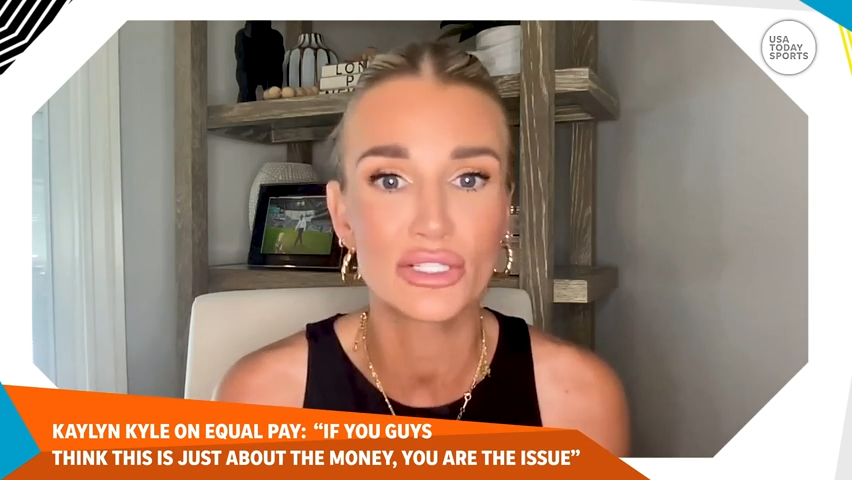[ad_1]

Canada Soccer star Kaylyn Kyle praises women’s team’s ‘resilience’ amid equal pay dispute.
Former Canada national team and NWSL player Kaylyn Kyle talks about the fight for equal pay and how the USWNT has spurred a movement across women’s football world wide.
USA TODAY
The U.S. Center for SafeSport is “failing” and additional legislation is needed to ensure athletes are protected, more than 100 athletes, including all 23 members of the U.S. women’s World Cup team and four members of last year’s men’s team, said in a letter to Congress.
Specifically, the athletes told members of the Senate and House of Representatives that SafeSport’s use of administrative closures and exclusive jurisdiction, as well as its appeals process, is leaving athletes vulnerable to abuse or causing them to be revictimized.
“As it stands, SafeSport is the only formal mechanism to keep bad actors out of our sport, and we are reliant on it as we work towards reform,” the athletes said in the letter, sent Wednesday. “SafeSport was created with noble and important intentions, but we believe that as it stands today, SafeSport is failing in what it was meant to achieve.”
The letter was signed by 103 current and former players from U.S. Soccer’s senior men’s and women’s teams and youth squads.
The letter echoes complaints U.S. Soccer made to USA TODAY Sports earlier this year, and continues the federation’s efforts to bolster safety following revelations of widespread abuse at all levels of the women’s game. U.S. Soccer has overhauled its player safety program to prioritize the vetting of coaches rather than trying to weed them out after the fact, and it wants to be able to keep those it considers bad actors out of the sport.
More: U.S. Center for SafeSport was created to protect athletes from abuse. But is it working?
But Congress gave SafeSport exclusive jurisdiction to investigate sexual abuse complaints in the Olympic movement. That, along with the Center’s high rate of administrative closures, is allowing potential abusers to remain in the sport, the athletes wrote.
Administrative closures occur when SafeSport decides there’s insufficient evidence or the victim chooses not to participate. Those are used “far too often,” the athletes said in their letter.
A representative for SafeSport did not immediately respond to a request for comment.
According to SafeSport’s 2022 annual report, administrative closures have been used in 4,500 of 12,751 cases since the Center opened in March 2017. Violations, meanwhile, were found in just 1,720 cases.
More troubling, former U.S. Attorney General Sally Yates’ report on abuse in women’s soccer pointed out that from June 1, 2020, through June 7, 2022, SafeSport administratively closed all but 25 of the 156 allegations of sexual misconduct involving U.S. Soccer participants that didn’t have a criminal disposition. That’s a whopping 84%.
“This is not a criminal court; SafeSport’s standards require only a preponderance of evidence to ban or otherwise restrict participation in sport,” the athletes wrote. “SafeSport should be expected to properly investigate claims and be held accountable for taking action based on those investigations.”
Compounding the problem is that when SafeSport uses administrative closures, exclusive jurisdiction prevents a governing body like U.S. Soccer from making its own determination of whether the person should be removed from the sport. In her recommendations, Yates said U.S. Soccer “should not rely exclusively on SafeSport to keep playerssafe” because of “how infrequently SafeSport makes findings or takes action.”
“U.S. Soccer wants to do the right thing and take proactive steps against suspected abusers,” the athletes wrote. “Our federation has tools and resources to investigate reports of abuse, but SafeSport is preventing them from participating in any way.”
The athletes also had harsh words for SafeSport’s appeals process, saying the immediate use of merits arbitration rather than a simple re-examination of the case for errors is damaging to survivors.
“The arbitration process can be damaging and retraumatizing for victims of abuse who have already participated in the process and shared their stories in full, only to have to do it all over again,” the athletes wrote. “If the victim decides not to go through the whole process again on appeal, the decision is automatically overturned, and the perpetrator is free to enter back into the sport.
“The appeals process harms victims in other ways, including by affording alleged perpetrators rights that victims do not have,” the athletes added. “Victims cannot appeal a decision that finds their alleged abuser was not culpable. And SafeSport does not turn over records to the victim so that they can be sure that justice was done.”
U.S. Soccer, other federations and victim advocates have all said they’ve offered to work with SafeSport to improve the system, only to be rebuffed. Athletes want a system that works, they wrote, but it is clear that will require assistance from Congress.
U.S. Sen. Richard Blumenthal, D-Connecticut, and Sen. Jerry Moran, R-Kansas, who co-sponsored the Empowering Olympic, Paralympic and Amateur Athletes Act, which became law in 2020, did not immediately respond to a request for comment.
“We are committed to working with you and other stakeholders to make the necessary changes to ensure that players are safe and protected from abuse,” the athletes wrote. “Together, let us work to create a safer future for all athletes.”
[ad_2]
